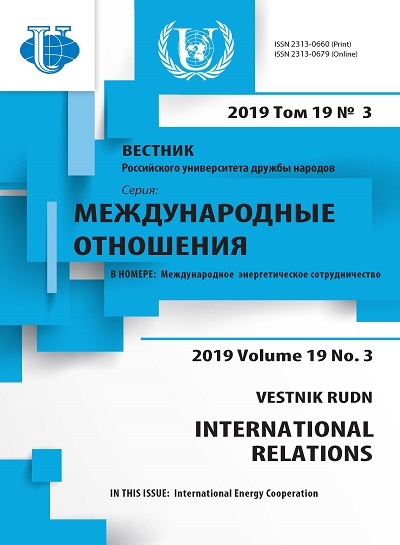Donald Trump’s Political and Psychological Profile
- Authors: Aybazova M.M.1
-
Affiliations:
- Lomonosov Moscow State University
- Issue: Vol 19, No 3 (2019): International Energy Cooperation
- Pages: 463-471
- Section: POLITICAL PORTRAITS
- URL: https://journals.rudn.ru/international-relations/article/view/22595
- DOI: https://doi.org/10.22363/2313-0660-2019-19-3-463-471
Cite item
Full Text
Abstract
The article presents the summary of the political psychology scientific research, fully corresponding to the academic traditions of the Department of Sociology and Psychology of Politics of Moscow State University. The study was devoted to a political and psychological analysis of the personality traits of populist-type politicians. The objectives of this study included psychological diagnosis and assessment of the personality of US President Donald Trump. A number of general scientific principles were used, including the principle of complexity, systematicity, subjectivity, integrability, reflexivity and optimality. The identification of basic psychological characteristics and the analysis of the most pronounced personality traits of Donald Trump were carried out using a methodology that combines wide research capabilities of of political science, psychology and sociology. The specificity of the research predefined using distant methods of data collection and processing, due to the inaccessibility of the studied personality. The biography method, content analysis and observation method were chosen as guiding. Scientific research concluded with forming a political and psychological profile of the American leader’s personality. According to the typology proposed by R. Ziller, he belongs to the category of “apolitical politician”, which indicates an overestimated self-esteem, nonconformism, and no dependence on the opinions of those around him. In addition, according to the L. Etheredge’s typology of styles of interpersonal relationships, Donald Trump is an extrovert with a high level of dominance. The political behavior of the President of the United States corresponds to the type of “agitator” in accordance with the typologies of G. Lasswell.
About the authors
Madina Magomedovna Aybazova
Lomonosov Moscow State University
Author for correspondence.
Email: aib.m@mail.ru
post-graduate student, Department of Sociology and Political Psychology
Moscow, Russian FederationReferences
- Ananev, B.G. (1977). Modern Problems of Knowledge about a Person. Moscow: Nauka publ. (In Russian).
- Ashcroft, A. (2016). Donald Trump: Narcissist, Psychopath or Representative of the People? Psychotherapy and Politics International, 14 (3), 217—222. DOI: https://doi.org/10.1002/ppi.1395
- Becker, A.B. (2017). Trump Trumps Baldwin? How Trump’s Tweets Transform SNL into Trump’s Strategic Advantage.
- Journal of Political Marketing, 1—19. DOI: https://doi.org/10.1080/15377857.2017.1411860
- Deviatko, I.F. (2006). Methods of Sociological Research. Moscow: Knijny dom Universitet publ. (In Russian).
- Egorova, E.V. (1988). Psychological Methods of Researching the Personality of Political Leaders in Capitalist States. Moscow: ISK RAN publ. (In Russian).
- Egorova-Gantman, E.V. (2003). Games in the Soldiers. Political Psychology of the Presidents. Moscow: Nikkolo M publ. (In Russian).
- Etheredge, L. (1978). Personality Effects on American Foreign Policy, 1898—1968: A Test of Interpersonal Generalization Theory. American Political Science Review, 72, 434—451.
- Gingrich, N. (2018). Understanding Trump. Moscow: Bombora; Eksmo publ. (In Russian).
- Harsin, J. (2017). Trump l’Oeil: Is Trump’s Post-Truth Communication Translatable? Contemporary French and Francophone Studies, 21 (5), 512—522. DOI: https://doi.org/10.1080/17409292.2017.1436588/
- Heuman, A.N. & González, A. (2018). Trump’s Essentialist Border Rhetoric: Racial Identities and Dangerous Liminalities. Journal of Intercultural Communication Research, 47 (4), 326—342.
- Hyatt, C., Campbell, W., Lynam, D. & Miller, J. (2018). Dr. Jekyll or Mr. Hyde? President Donald Trump’s Personality Profile as Perceived from Different Political Viewpoints. Collabra: Psychology, 4 (1), 29. DOI: http://doi.org/10.1525/collabra.162
- Immelman, A. (2017). The Leadership Style of U.S. President Donald J. Trump. Saint John’s University. URL: https://www.researchgate.net/publication/312771718_The_Leadership_Style_of_US_President_Donald_J_Trump (accessed: 07.07.2019).
- Koretskaya, O.V. (2017). Linguostylistic Features of Donald Trump’s Political Rhetoric. Teacher XXI century, 2, 2, 349—355. (In Russian).
- Lasswell, H. (2005). Psychopathology and Politics. Moscow: RAPS publ. (In Russian).
- Lee, B.X. (Eds). (2017). The Dangerous Case of Donald Trump: 27 Psychiatrists and Mental Health Experts Assess a President. New York: Thomas Dunne Books, St. Martin’s Press.
- McClelland, D.C. (1975). Power: The Inner Experience. Oxford: Irvington.
- Ott, B.L. (2017). The Age of Twitter: Donald J. Trump and the Politics of Debasement. Critical Studies in Media Communication, 34 (1), 59—68. DOI: https://doi.org/10.1080/15295036.2016.1266686
- Popov, S.V. (2002). Visual Observation. Saint Petersburg: Rech publ. (In Russian).
- Rakityansky, N.M. (2011). Politician’s Personality: Theory and Methodology of Psychological Profiling. Moscow: Moscow University Press. (In Russian).
- Salkin, A. & Short, A. (2019). The Method to the Madness: Donald Trump’s Ascent as Told by Those Who Were Hired, Fired, Inspired — and Inaugurated. All Points Books.
- Seal, K.L. (2017). Take My President, Please! OR: A Former Stand-Up Comedian Turned Psychotherapist Examines Why Trump Is Not Funny. Contemporary French and Francophone Studies, 21 (5), 538—547. doi: 10.1080/17409292.2017.1437701
- Shapiro, M. (2016). Trump This! The Life and Times of Donald Trump, An Unauthorized Biography. Riverdale Avenue Books.
- Shestopal, E.B. & Selezneva, A.V. (Eds). (2015). The Modern Elite of Russia: Political and Psychological Analysis. Moscow: ARGAMAK-MEDIA publ. (In Russian).
- Shestopal, E.B. (Eds.). (2018). Political Psychology. Moscow: Aspect Press publ. (In Russian).
- Trump, D. & Zanker, B. (2013). Think Big and Kick Ass. Moscow: Mann, Ivanov and Ferber publ. (In Russian). Trump, D. (2012). The Art of the Deal. Moscow: Eksmo publ. (In Russian).
- Williams, E.A., Pillai, R., Deptula, B.J., Lowe, K.B. & McCombs, K. (2018). Did Charisma «Trump» Narcissism in 2016? Leader Narcissism, Attributed Charisma, Value Congruence and Voter Choice. Personality and Individual Differences, 130, 11—17. doi: 10.1016/j.paid.2018.03.010
- Ziller, R., Stone, W., Jackson, R. & Terbovic, N. (1977). Self-Other Orientations and Political Behavior. In: Hermann, M. & Milburn, T. (1977). A Psychological Examination of Political Leaders. NY: The free press.











